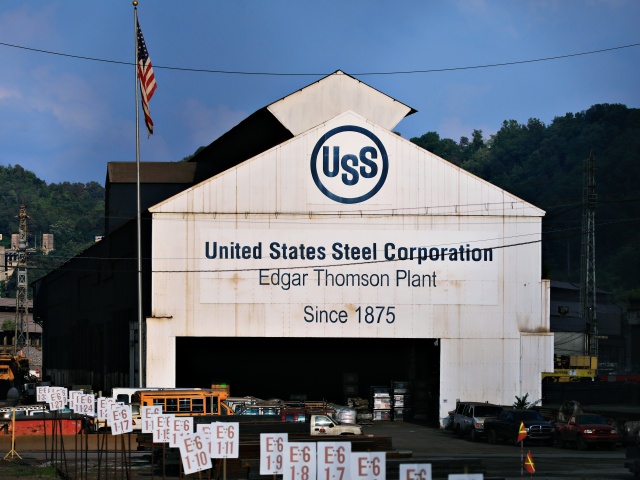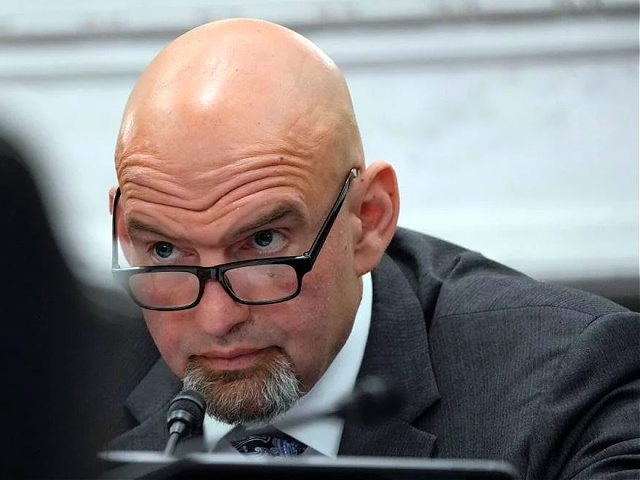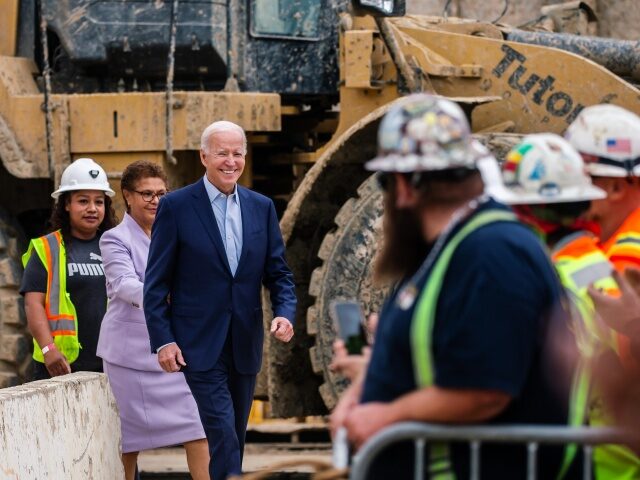Sens. J.D. Vance (R-OH), Josh Hawley (R-MO), and Marco Rubio (R-FL) are calling on President Joe Biden to block the sale of the United States Steel Corporation by Japan’s largest steelmaker.
As Breitbart News reported, executives with U.S. Steel and Nippon Steel Corporation (NSC) announced the nearly $15 billion deal, which would have the iconic American steel giant sold off to the Japanese company.
In response, Vance, Hawley, and Rubio have written to Biden’s Treasury Secretary, Janet Yellen, — who chairs the Committee on Foreign Investment in the United States (CFIUS) — to ask that she block the Japanese acquisition of U.S. Steel.

The U.S. Steel Corp. Edgar Thomson Works steel mill in Braddock, Pennsylvania, U.S., on Wednesday, July 21, 2021. U.S. Steel is expected to release earnings on July 29. Photographer: Luke Sharrett/Bloomberg
“The transaction marks a turning point for an icon of American industry and has dire implications for the industrial base of the United States,” the Senators write:
The transaction was not entered into with U.S. national security in mind. When U.S. Steel announced its “review of strategic alternatives” in August, it pledged to adopt a “measured approach.” But the board’s fiduciary duty was to its shareholders, and U.S. Steel has admitted that the very reason for the sale was its desire to “maximiz[e] value for . . . stockholders.” The transaction was not the product of careful deliberation over stakeholder interests, but rather the result of an auction to maximize shareholder returns. The joint press release announcing the all cash transaction led off with a declaration about the transaction’s “certain and immediate value to U.S. Steel shareholders.” [Emphasis added]
Despite the absence of any security-focused deliberation on U.S. Steel’s part, domestic steel production is vital to U.S. national security. Democratic and Republican administrations have both acted decisively over the last forty years to bolster the industry. The endurance of President Trump’s Section 232 tariffs on steel imports demonstrates that the preservation of the domestic steel industry remains vital to our national security. Trade protections can and should induce foreign investment that expands domestic production and creates American jobs. This corporate takeover is out of step with those goals. Allowing foreign companies to buy out American companies and enjoy our trade protections subverts the very purpose for which those protections were put in place. [Emphasis added]
According to the Senators, NSC receives billions in subsidies from the Japanese government and has a history of violating U.S. trade law. In addition, the U.S. trade deficit, at $14 trillion today, would only be exacerbated by NSC’s acquisition of U.S. Steel.
“As recently as August 2021, NSC was found guilty of unlawfully dumping flat-rolled steel products into the U.S. market,” the Senators write:
This acquisition is not occurring in a vacuum. The United States has run a trade deficit for nearly half a century. Our cumulative trade debt now stands at more than $14 trillion. Over the last five years, we have run an average annual trade deficit of more than $65 billion with Japan alone. One of the promised benefits of such unbalanced trade is that we run a capital account surplus: We import the world’s goods, and they consume our financial assets in return. In theory that may sound fine. But issues become apparent when those financial assets include critical pieces of the American industrial base. [Emphasis added]
The Committee cannot rebalance American trade or reshape its corporate governance, but it can mitigate some of the worst consequences of both. It can and should block the acquisition of U.S. Steel by NSC, a company whose allegiances clearly lie with a foreign state and whose record in the United States is deeply flawed. We urge the Committee to initiate a review of the transaction unilaterally, particularly in light of the fact that U.S. Steel received competitive bids from American companies who would not pose the same risks. [Emphasis added]
When former President Donald Trump was in office, his agencies routinely blocked foreign corporations from buying up American companies, often in the name of national security. In 2017, for example, Trump blocked the Chinese acquisition of a U.S. semiconductor company.
Trump’s CFIUS, in 2019, also blocked eight deals that would have had foreign corporations purchasing American companies.
Sen. John Fetterman (D-PA) is also calling on Biden’s agencies to block the acquisition of U.S. Steel by NSC.

Chairman Sen. John Fetterman, D.Pa., listens during the Senate Agriculture, Nutrition and Forestry subcommittee hearing on SNAP and other nutrition assistance in the Farm Bill, Wednesday, April 19, 2023, on Capitol Hill in Washington. (AP Photo/Mariam Zuhaib)
“It’s absolutely outrageous that they have sold themselves to a foreign nation,” Fetterman said in a video posted to Twitter.
“And a company cannot do that. Steel is always about security as well too and I’m committed to doing anything I can do from using my platform or my position to block this,” Fetterman continued. “I’m going to fight for the steelworkers … and we cannot ever allow them to be screwed over or left behind.”
The acquisition of @U_S_Steel by a foreign company is wrong for workers and wrong for Pennsylvania. I’m gonna do everything I can to block it. pic.twitter.com/9EqohwRhRJ
— Senator John Fetterman (@SenFettermanPA) December 18, 2023
The United Steelworkers (USW) is also putting pressure on the Biden administration to block the acquisition, issuing a statement condemning the sale of U.S. Steel to NSC as “the same greedy, shortsighted attitude that has guided U.S. Steel for far too long.”
The sale of U.S. Steel, which was founded in 1901 by Andrew Carnegie, J.P. Morgan, and Charles Schwab, to NSC is significant as the steelmaker served a critical role in the nation’s “Arsenal of Democracy” during World War II.
Among several American companies that helped the Allies defeat the Axis Powers, which included Imperial Japan, U.S. Steel made the U.S. the world’s largest steel producer during the war with Pennsylvania becoming the nation’s steel capital.
John Binder is a reporter for Breitbart News. Email him at jbinder@breitbart.com. Follow him on Twitter here.

COMMENTS
Please let us know if you're having issues with commenting.